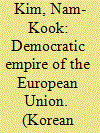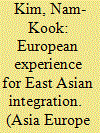| Srl | Item |
| 1 |
ID:
157760


|
|
|
|
|
| Summary/Abstract |
Recent security challenges in East Asia have provided an opportunity to realize the
need for community building as a way of detouring military deadlock. This paper
suggests two principles of community building in East Asia: (1) identity balanced
by interest, and (2) an Asia of citizens beyond an Asia of states. These principles can
be applied to the community building sub-areas of politico–economic, security, and
sociocultural cooperation. The author examines the following topics accordingly:
(a) an invalid concept of the “Asian paradox” and the statement made by Japan’s
prime Minister Shinzo Abe in the politico–economic area; (b) the Helsinki Accord
and the EU Global strategy with their implication for East Asia in the security area;
and (c) the Campus Asia program and the Asian Human Rights Court as a means to
encourage sociocultural cooperation. With its complicated history of animosity and
low levels of intraregional trade, fostering a shared identity and finding common
interests in East Asia is no easy task. If some identities are given and others are
chosen, it is important to manage the negative effects of identity and encourage the
positive influence of its chosen dimensions.
|
|
|
|
|
|
|
|
|
|
|
|
|
|
|
|
| 2 |
ID:
108582


|
|
|
|
|
| Publication |
2011.
|
| Summary/Abstract |
This paper examines the EU's conflicting roles as a global actor between a normative
leader and a realistic compromiser. Since the Kosovo and Iraq wars, the EU has
experienced rapid progress in two policy areas: asylum and refugees; security and
defense. Although the two policy areas belong to different pillars, they were both
accelerated through the wars where Europe painfully recognized its incompetence.
This paper argues that increasing prioritization of security issues eventually
undermines the foundations of the EU's established commitment as a normative
leader in the area of human rights policies. Fortress Europe with strong military
power and clear borders would build the wall between Europe and non-Europe
higher and reinforce the characteristics of the EU as a realistic compromiser that
regenerates the exclusive nature of nation states, only different in its gigantic size.
It would then be difficult to distinguish the EU's identity as a new experiment of
peace projects from a neo-imperial hegemon of the world.
|
|
|
|
|
|
|
|
|
|
|
|
|
|
|
|
| 3 |
ID:
088761


|
|
|
|
|
| Publication |
2009.
|
| Summary/Abstract |
This paper traces the possibility of East Asian integration through comparison with the early stage of European integration on three different levels: ideas, national interests, and international circumstance. Judging from the European experience, ideas always come first, then national interest contests, and eventually the international circumstance conditions the context. I compare the multilateral approach in Europe with the imperial hegemony competition in East Asia, Adenauer's regionalization policy in Europe with the Yoshida line of Westernization detouring from Asia, and the US and Russia's different roles in the two regions as external forces constraining the international order. My conclusion for the future of East Asia is located somewhere between views of procedural divergence and fundamental skepticism.
|
|
|
|
|
|
|
|
|
|
|
|
|
|
|
|